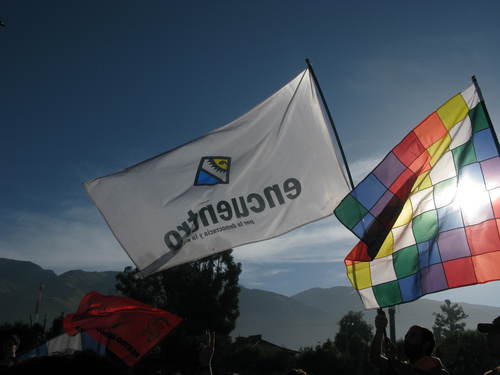We arrive in the stadium of the University of Univalle at 8am, walking through a gauntlet of military police, naval police, army officers, cobra special SWAT troops, etc. The bleachers are sparsely populated by Bolivians with their union banners hanging off the upper steps. The main group in the center of the field is a huge contingent of extremely vocal Argentinians from a group called Los Pibes (the kids), with bright blue banners waving in the early morning sunlight. They created an incredibly festive atmosphere, chanting what sounds just like a football chant, but with some souped-up words: “Olé, Olé, Ola, Yo non so Yanqui e No Quiero Ser, Sono Con Chavez, Correa, e Fidel” (Olé, Olé, Ola, I’m not a Yanky and I don’t Want to Be One, I’m with Chavez, Correa, and Fidel). Their other chant, with huge banners waving from bamboo flags, was “Alerta, Alerta, Alerta Che Camina, La Espada De Bolivar por America Latina” (Watch Out, Watch Out, Watch Out, The Sword of Bolivar is Marching through Latin America).
There are two MCs of the affair: a man dressed in a western suit, who speaks in Spanish, and a woman dressed in traditional dress and speaking Quechua. Things warmed up gradually with a procession of singers from different countries in Latin America; my favorite is an Argentinian singer who sang a song dedicated to Evo Morales called “The Woodpecker.” In between acts, the MCs talked about the many representatives present at the conference and the importance of protecting pachamama – Mother Earth. When the music really heated up, the spectacle intensified – there was someone dressed in what looked like a team mascot outfit as a 19th century Bolivian military officer who was swing dancing in front to the crowd with a woman dressed in indigenous garb.
After a few performers sang, these presentations were interrupted by a procession of indigenous peoples from the Americas, who walked through the crowd surrounded by billowing clouds of incense. They performed a ritual in front of the crowd to beg pachamama for forgiveness for our desecration of the planet. There was a long incantation by an old Quechua man as he lit some sort of sacred fire. Then a group of Machateros, dancers from the eastern part of Bolivia carrying machetes and wearing spectacular crowns of exotic bird feathers, began dancing in circles.


Next, a series of speakers appeared. First up, significantly, was a Native American woman from Alaska. She spoke about how her people had survived European genocide. We continue to fight, she said, to protect mother earth. The imperialists cannot sell what the creator has given us. We must stop, she said to cheers and chants, corporate interests from stealing pachamama. We have a choice of two paths: the path of life or the path of extinction.
After her, a representative from the European parliament and the United Left in Europe spoke, bringing greetings and saying in unequivocal terms that those responsible for the failure of the Copenhagen conference on climate change are the rich countries of the global north. We need to stop these countries and abolish the capitalist system, which victimizes the poor. We from the European Left offer our solidarity with Bolivia.
A representative from Africa, who brought greetings from Friends of the Earth International, said that the people of Africa completely reject false market-based solutions. Commodification of nature is not the way forward. Similar comments from a man from India, who talked about the need to create a new planet.
These presentations concluded with a speech by a representative of La Via Campesina from Brazil. She began by saying that we need to globalize the struggle. We’re here, she said, to change this capitalist system, not the climate. This system is a system of death, it produces death. We have to embrace life and another model of development. We need agrarian reform and land redistribution, local agricultural systems, and food sovereignty. In addition, we need to form alliances with governments like Bolivia’s that are dedicated to protecting the earth.
The presentations closed with a brief speech by an envoi of the U.N. The Argentinian comrades were not happy with this representative of the U.N., and began their “Olé” chant again. She tried to keep going but eventually gave up and went away.
Photos are by Juan Antigua, one of my NY delegation comrades.


